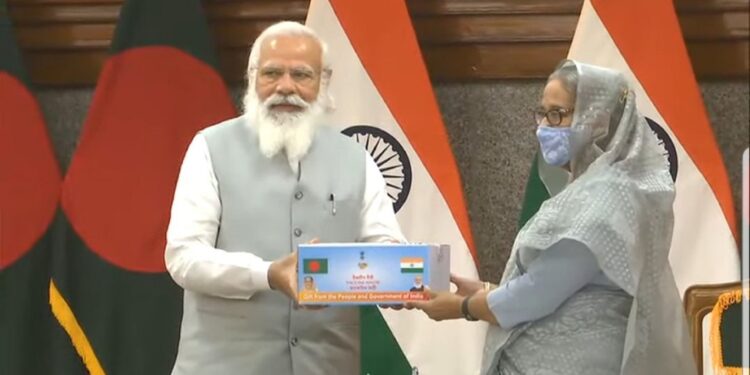A file image. Photo: Twitter/@AninBanerjee
(This article by Chandan Nandy first appeared in Bangladesh’s premier news portal www.bdnews24.com earlier this morning. In less than two hours after the article’s publication, both the English and Bengali websites of bdnews24.com was blocked for viewers/readers in Bangladesh as well as India)
Not many South Asian leaders command New Delhi’s respect and warmth as much as Bangladesh Prime Minister Sheikh Hasina. For years, she has been a loyal and trusted-neighbourhood ally even as others in the sub- continent have chosen to drift away towards China. But this allegiance has now undergone a not-so-subtle change. It is not that Delhi-Dhaka diplomatic relations have turned frosty. Neither is there any obvious chill.
As Bangladesh heads for general elections in January 2024 — the polls could be advanced by a month just as they were last time — the country is abuzz with the gaggle for just what degree of “free and fair” measures would be allowed by the incumbent Awami League in the already charged atmosphere.
Powerful global and regional players have also jumped onto the bandwagon with the United States insisting — even more strongly than the last time in 2018 — that Sheikh Hasina creates conditions for free and fair elections and not repeat the “farce” of five years ago. India’s voice remains muted, though it will certainly play a big role and manoeuvre as much as it can. On their part, the Chinese have made it rather clear who they want to put their money on. Over the past 10-12 months, there have been a series of visits in quick succession by senior Chinese functionaries to Dhaka.
But what about Dhaka? The brush meeting between Indian Prime Minister Narendra Modi and Hasina at the Johannesburg BRICS summit in the third week of August was exactly what it was: a brief brush between two seeming friends. On the other hand, Hasina had a closed-door meeting with Chinese President Xi Jinping. This, by and in itself, was significant.
While Hasina was in Johannesburg, her Foreign Minister AK Abdul Momen left his other cabinet colleagues and many in Dhaka’s political circles and policy wonks astonished and stunned by telling a TV news channel that Xi Jinping told Hasina that “China will fulfil her dream of a golden Bengal, an economically strong Bangladesh”.
Consulting, every now and then, a written brief held firmly in his hand, Momen continued to elaborate on the rosy economic and developmental “synergy” that China wants to unfold and usher in Bangladesh. There was more: he said Hasina sang paeans of the opportunities that have come Dhaka’s way since the country joined the Chinese Belt and Road Initiative (BRI). “But Bangladesh’s needs are much more,” he quoted Hasina having told Xi. Hasina, according to Momen, wanted to “expedite” a Bangladesh-China free trade agreement.
This has certainly left the Indian foreign policy establishment stoney-faced and impassive, indicating the stunning effect these revelations have had on South Block and the pace at which Dhaka was willing to rush to court Beijing. Meanwhile, senior Awami League sources said while the US and the rest of the Western bloc are “adamant” and “continue to keep up pressure on Dhaka to ensure free and fair elections,” New Delhi has conveyed to the Awami League leadership to not “pursue seeking the re-election of five important and a few other middling ministers in Hasina’s government who enjoy strong Chinese support.” Indeed, these sources said that the Western bloc, including the US, seek to play a role “far stronger than India” in shaping the road for relatively free and fair elections in Bangladesh.
But, Awami League sources said, Hasina may not play ball with India and not agree to drop five powerful ministers, including an adviser to Hasina who holds cabinet rank, when she comes visiting on Sept 8 to attend the G-20 summit in New Delhi.This would be an open defiance of New Delhi whose foreign policy and security establishments have always routinely “tailored” and “vetted” the list of potential Awami League election candidates in the past.
If Hasina decides to disregard India’s stand and choose to continue with the “tainted five”, it would signal something more ominous than even the progressively strong China-Bangladesh economic dalliance. It would mean a deep Chinese penetration of India’s only political ally in Bangladesh and consequently loss of control over Dhaka.
However, the only concession that the Awami League government is likely to make is to partially reduce the level of repression on opposition party leaders, cadres and supporters. This time around, there are few reports of “disappearance” of opposition party cadres. In fact, the Hasina administration’s police and security establishment has begun allowing opposition political rallies for which a large number of people from different parts of Bangladesh have been gathering in Dhaka even as anti-India sentiments have deepened and widened.
The Indian establishment is not interested in the main opposition Bangladesh National Party (BNP), which took part in the 2018 general elections as part of a coalition of political forces under the banner of the Oikkyo Jote (Combined Alliance) under the leadership of the Sheikh Mujib loyalist and erstwhile Awami League minister Kamal Hossain.
Last time, the BNP leadership had taken desperate measures to reach out to key Indian functionaries in Delhi. But the moves were rebuffed and the delegation was met with unconcealed coldness, if not complete hostility for the party’s past record of being “anti-India” and for being partners with regressive forces such as the Jamaat-e-Islami. This time, the BNP, which has been holding political rallies in Dhaka and Chattogram, has not bothered to contact senior Indian functionaries in Delhi with the party planning to head into the elections without supplicating to Indian decision-makers.
*(The writer is a New Delhi-based senior journalist)
The original article can be viewed here.

